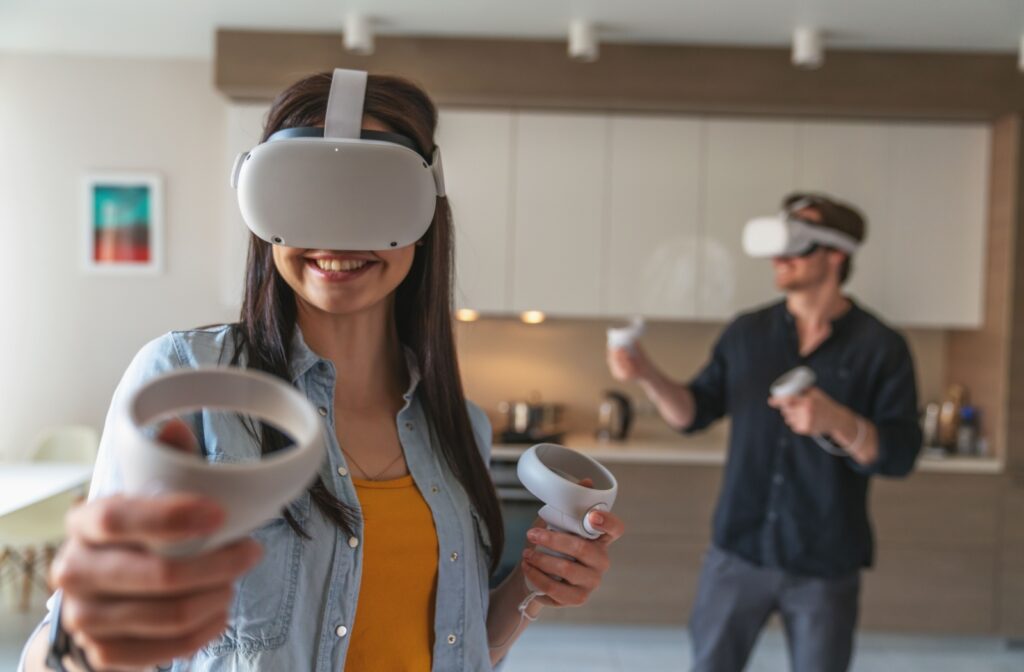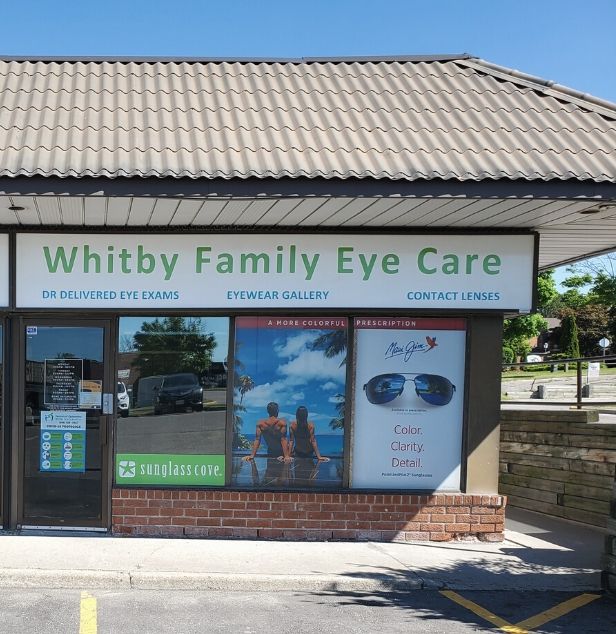The technology behind VR is detailed, and complex, and raises questions about its impact on our ocular health.
While we don’t know what the long-term ocular effects of VR currently are, moderate use isn’t bad for your eyes.
Prolonged exposure to VR can lead to discomfort, including:
- Accommodation-vergence Conflict
- Children’s Eye Development issues
- Digital Eye Strain
- Motion Sickness
What is Virtual Reality & How Does it Work?
Virtual Reality (VR) is a simulated experience that can mimic or be entirely different from the real world.
It uses computer technology to create a three-dimensional immersive environment that users can interact with through specialized hardware, such as VR headsets and controllers. While worn, these headsets completely cover the eyes of the user.
VR systems work by utilizing stereoscopic displays to create a sense of depth and immersion. The key components of VR include:
- VR Headset: This device contains two screens or lenses placed very close to your eyes, similar to eyeglasses. Each screen shows a slightly different image to each eye, mimicking how our eyes perceive depth in the real world.
- Sensors and Trackers: These are used to detect the movement of your head and adjust the display accordingly. This makes sure the virtual environment reacts to your movements.
- Controllers: Hand-held devices allow you to interact with the virtual environment.
How Does Virtual Reality Impact Vision?
Virtual reality as we know it is a relatively new developing technology. Research concerning its impact on ocular health is still ongoing. We have yet to learn of any long-term health effects associated with prolonged use of VR.
Currently, VR is considered safe for the eyes. In some cases, VR may be used as a tool in eye care for vision therapy and glaucoma testing.
VR is a great tool for learning, exploring, and fun when used in moderation. The concern for eye health arises when VR is used for prolonged periods as it may lead to:
- Accommodation-vergence conflict
- Children’s eye development
- Digital eye strain
- Motion sickness
Accommodation-vergence Conflict
Our eyes naturally adjust their focus when looking at objects at different distances through a process known as accommodation. Similarly, our eyes converge to maintain single binocular vision, which allows us to perceive depth and the relationship between different objects.
When looking at very close-up objects, like a bug on our nose, our eyes cross to focus on the object. When we look at objects at a distance, our eyes look parallel to the object
In VR, the eyes are forced to focus on a fixed distance, the screen, making it difficult for our eyes to look parallel in the distance and increasing the chances of crossing our eyes. Our eyes cannot properly accommodate the nearby screen, leading to accommodation-vergence conflict.
This discrepancy can result in:
- Eye strain and fatigue
- Visual discomfort
- Blurry vision
Children’s Eye Development
Children’s eyes grow and develop until they reach about 20 years old. Around this age, we see vision prescriptions stabilize. Caring for our children’s eye development is important as their vision can change significantly during this time.
Most VR manufacturers say this technology is not suitable for children under the age of 13, likely due to the content of some of the games. However, no long-term studies demonstrate that VR headsets damage eye health or function.
Children can use VR occasionally under the supervision of their parents. Prolonged exposure to VR, like other digital screens, can interfere with visual development:
- Difficulty in focusing on real-world objects
- Visual stress and eye strain
- Myopia progression and high myopia
The prevalence of myopia in children is increasing and is occurring earlier in children, around 6-7 years old, in comparison to previous generations. Environmental conditions like increased nearby work and reduced outdoor play, are factors in myopia development in children.
Myopia itself is not a serious condition, but developing high myopia (-6.00 diopters) can lead to an increased risk of developing certain eye conditions. Myopia cannot be cured but myopia progression can be slowed with early intervention and myopia management.

Digital Eye Strain
Similar to using screens like smartphones, laptops, and tablets, using VR for extended periods can lead to digital eye strain.
Accommodation-vergence conflict occurs when devices, like VR, are the close focus point for the eyes. Focusing on a screen for concentrated periods of work can lead to this conflict, as well as eye strain, muscle fatigue, and decreased blinking leading to dry eyes.
Our eyes have to exert extra effort to maintain a clear image when looking at screens. Uncorrected refractive errors can exacerbate digital eye strain while individuals with no refractive errors can experience this concern as well.
Symptoms of digital eye strain include:
- Blurry vision
- Difficulty focusing
- Dry eyes
- Neck and Shoulder pain
Motion Sickness
Experiencing motion sickness is a common concern when using VR. This occurs when there’s a disconnect between what your eyes see and what your body feels.
VR works by mimicking an immersive visual experience which is why your vision functions as normal but your body is unable to physically share the same surroundings. Fortunately, this sensation is temporary, but it doesn’t feel great.
Symptoms of motion sickness include:
- Difficulty maintaining balance
- Dizziness
- Headaches
- Nausea or vomiting
Keep Your Eyes Protected While Using VR
Fortunately, the impact of VR on vision and eye health doesn’t lead to serious concerns. We can implement strategies to avoid accommodation-vergence conflict, eye strain, muscle fatigue, and motion sickness.
- Reduce Screentime: Try to limit the amount of time you spend in VR. While it’s tempting to get lost in these immersive worlds, moderation is key to protecting your eye health.
- Regular Breaks: The 20-20-20 rule is a helpful guideline when doing any closeup work. Every 20 minutes, take a 20-second break and look at something 20 feet away. This gives your eyes a chance to rest and reduces strain.
- Proper Lighting: Use VR in a well-lit room to minimize the contrast between the virtual environment and your actual surroundings. This can help reduce eye strain.
- Blue Light Filters: Some VR headsets come with blue light filters or settings to reduce blue light exposure, which can help minimize digital eye strain.
Schedule an Appointment
VR offers exciting experiences but it’s important to be mindful of its potential impact on eye health. VR devices don’t lead to serious vision concerns but can lead to ocular discomfort which can impact daily living and quality of life.
If you’re experiencing eye discomfort, connecting with our team at Whitby Family Eye Care can help identify the root cause and alleviate your symptoms.







